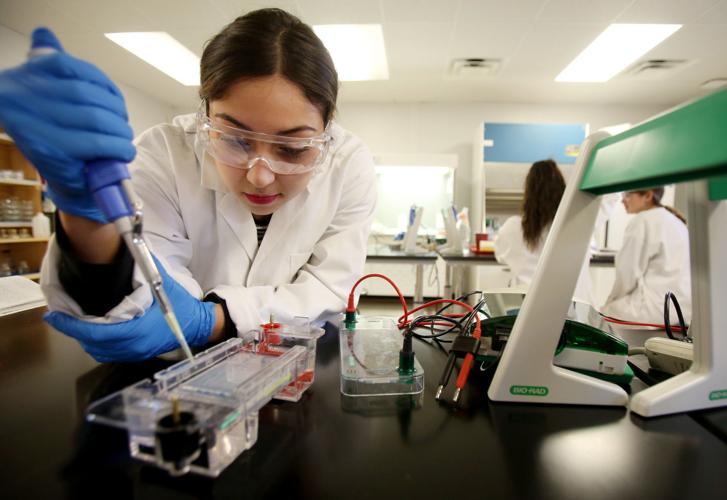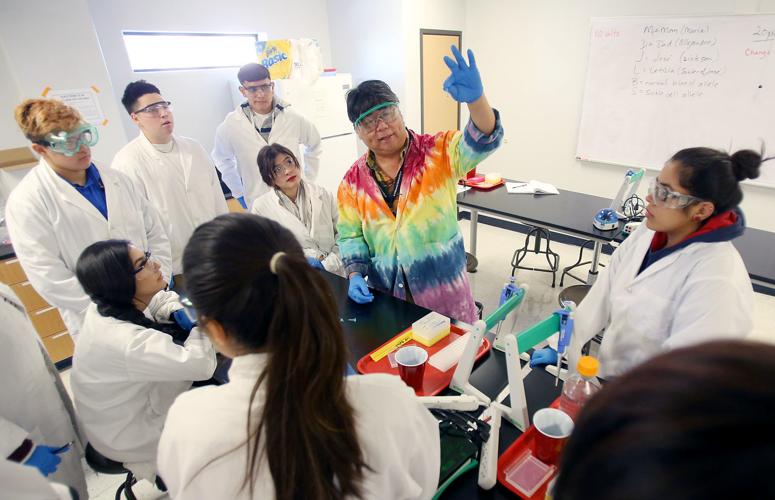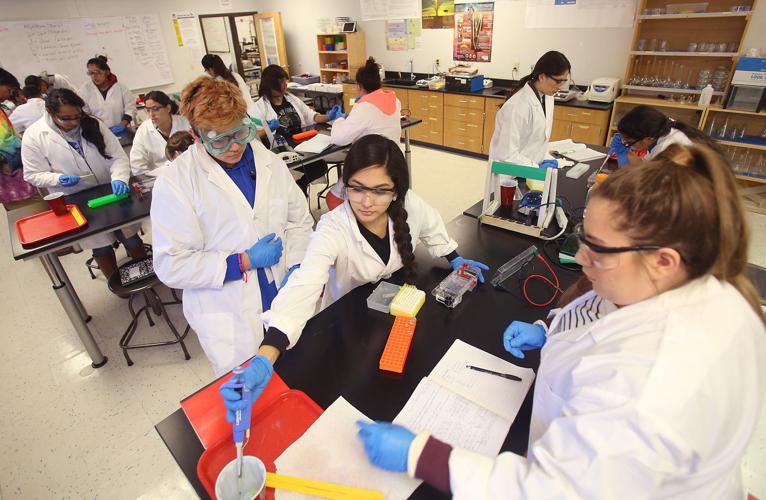Finding job-shadowing opportunities for Sunnyside High School’s bioscience JTED students proved a difficult job for the class teacher, Steve Uyeda.
But, since the whole point of a JTED program is to offer real work experience to students, Uyeda didn’t give up.
Instead, he brought the work to the school’s lab.
“I knew some people at Native Seeds/Search and the university, so I said ‘Look my students can do basic DNA work. Is there any basic DNA work that you want done but haven’t been able to do because of time and or finances and we will do that for you gratis,’” he said.
Native Seeds/Search was interested in finding out if their 500 different seed lines of corn were free of genetically modified materials. Uyeda agreed to have his students find out.
Students began doing the work last school year and presented their first set of findings to Native Seeds/Search in September.
“They were really impressed and even though it was just eight ascensions out of 100, it was a start and hopefully other bioscience programs in Tucson will start participating in the work as well,” Uyeda said.
Being sure their seeds have no GM content is important to Native Seeds/Search, but it was also important for the nonprofit to provide the educational service to the school.
“We have a very strong educational and outreach component to our work, so we thought it was extremely valuable to provide a project and a source for students to engage with our work and give them an opportunity to see how the skills they are learning have a real-life application,” said Joy Hought, education coordinator for Native Seeds/Search. “They provided a service for us, but they also got to see a connection to a new technology and old material and it gave them an opportunity to ask questions about material and learn about it.”
If the nonprofit was paying for this service, it would cost tens of thousands of dollars, Hought said.
So, a service like this could be a win-win for others as well.
“We partner with small farmers in the Southwest who also have questions whether they can provide GM-free material to their buyers, so potentially a small grass-roots service like Steve’s class could really help small farmers who typically wouldn’t have access to technical support,” Hought said.
Students who participated in the lab work on the first batch of seeds say the experience was invaluable.
“I think it’s gratifying that they chose us and trusted us to do something that had to do with their company,” said Esmeralda Montano, senior and third year bioscience student.
After three years in the program, Montano feels confident that she could walk into any lab and know what to do.
“It’s not just that I’m learning, but it’s being used and is important for the community,” said Monique Trujillo, a senior and third-year bioscience student.
Trujillo always was a self-proclaimed “science geek” but never wanted to be a doctor or a nurse. She loves the lab work and has found more of an interest in plant biology.
“It showed me what I wanted to do,” Trujillo said. She plans to go to college to study biochemistry or molecular biology.
CONTINUED WORK
WITH NATIVE SEEDS/SEARCH
This school year, students are working with 12 seed types for Native Seeds/Search.
Interesting varieties from Northern Arizona, northern Sonora and a plant “that’s supposed to be the mother of all corn” were sent to Uyeda’s class.
“So some of my kids are going to be extracting DNA and see how all of it is related,” Uyeda said. “So, their science fair project is coming out of this.”
Students will work with a scientist from Native Seeds/Search on the project to find out how closely the seed types are related and how they’ve evolved from a common ancestor.
GETTING KIDS INTERESTED
Many students don’t know what to expect when they start in the bioscience program, said Uyeda, who has been teaching at Sunnyside for 12 years. But shortly after the start of classes, they are hooked.
“Then they find out I don’t spend lots of time talking to them,” he said. “They spend a lot of time in the lab. We’re in the lab at least 50 percent of the time.”
That was the case for Viviana Alvarado, a senior and second-year bioscience student. She says it was recommended she take the class but she didn’t know what it was.
“I kept going because I liked it,” Alvarado said. “I learned how to prepare a lab and follow protocols for experiments.”
Alvarado isn’t sure exactly what she wants to do after high school, but does know she wants it to be in the science field, thanks to the JTED classes.
Another Sunnyside senior, Aileen Leon Rios, was hooked on the hands-on nature of the program. She was introduced to it as a sophmore and “thought it was cool” when students got to extract their own DNA, via swabbing the cheek.
“I liked that we would learn something and then do it on our own,” Leon Rios said.
Students are assessed each quarter through lab practicals.
“They have to know how to do things because I’m training them to work in a lab...The kids will tell you I have two personalities. When I walk through the lab door, I become lab manager,” Uyeda said.
Students face many challenges working in the lab — from being organized to learning protocols and staying focused.
But, it’s more than training in a lab.
“With how complex most programs and careers are, it’s a lot more,” Uyeda said. “They’re not just having lessons on this is how you mix solutions, this is how you do this...They learn the science behind it. Technology is advancing so quickly, they need to be able to say ‘I know how this procedure works. This is what my boss wants. How can I tweak the procedure to get what my boss wants.’
Developing critical thinkers
Its not the breadth of knowledge, it’s how deep we have to get to really understand what’s going on. With genetics and DNA it’s tougher because they can’t see anything. They have to infer everything and so there’s a lot of critical thinking involved. So, ‘if you get this result what does it mean’ is a common question I use.”
The experience has influenced some students to stay in the science fields post-high school.
Anissa Alvarado graduated in May and was one of the students who worked on the first batch of seeds from Native Seeds/Search.
Alvarado has started at Pima Community College to earn her biotechnology certificate and hopes to hopes to transfer to the University of Arizona to learn biomedical engineering.
“It’s a great program and it has given me so much,” she said of Uyeda’s class. “Because when I transferred from a different high school, I was kind of depressed because it wasn’t an environment I was used to and his class gave me life. It got me excited to want to do more and helped me choose a career I want in life.”
BIOSCIENCE BOOM
The bioscience industry is growing in Arizona.
“This is a growth industry and I’m preparing the kids,” Uyeda said. “If you look at any hospital, you’ll find they need medical lab techs. Most of my kids can work in a medical lab at the basic level. With the expansion of health care, there needs to be more lab workers to handle the volume of more samples.”
There are also more biotechnology and engineering firms starting up, Uyeda said.
“As they begin tooling up production, they need more people,” Uyeda said. “Those are my kids and the Tucson High kids, the Pueblo kids. ... Those are our kids.”
There are 12 JTED programs in bioscience in Tucson. However, Ureyda worries about the program’s future.
“If the planned budget cuts from the state go through, next year will be the last year of the program. ... I’m looking over my equipment and I’m saying, ‘It’s been about seven years and some of it is starting to wear out. I need to start replacing it,’” Uyeda said. “The point is I want to train these kids to such an extent that when they graduate high school and if they choose to go to college or not, they can step into anybody’s lab and they have that much advantage because they already know how to do things. That’s the point.”






